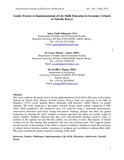| dc.contributor.author | Ndirangu, AN | |
| dc.contributor.author | Wamue–Ngare, G | |
| dc.contributor.author | Wango, G | |
| dc.date.accessioned | 2013-06-22T11:32:54Z | |
| dc.date.available | 2013-06-22T11:32:54Z | |
| dc.date.issued | 2013 | |
| dc.identifier.citation | International Journal of Education and Research Vol. 1 No. 5 May 2013 | en |
| dc.identifier.uri | http://www.ijern.com/images/May-2013/38.pdf | |
| dc.identifier.uri | http://erepository.uonbi.ac.ke:8080/xmlui/handle/123456789/38181 | |
| dc.description.abstract | This study explored the
gender factors facing implementation of Life Skills Education in
S
econdary
S
chools
in Nairobi East District
, Nairobi County, Kenya
. Data
was analysed in the light of
Bandura’s (1977) social learning theory integrated with Pearso
n’s (2002) Theory
on gender
relations. The study employed a descriptive research design whose sample comprised of PDE
office. Both quantitative and qualitat
ive data
was collected using a structured questionnaire,
observation
, interviews and
Focus Group Discussions
. Findings indicate that there a
re gender
limitations in selecting life skills' teachers in schools and
those life skills
was mainly taught by
female teache
rs. Teachers indicated that they were uncomfortable teaching sensitive topics to
students of the opposite sex and that the syllabus was not fully covered. The majority of female
students did not like sharing their problems with boys and preferred
girls.
Th
is suggests gender
specific
barriers
in the teaching of life skills in schools. In addition, findings revealed that principals
of schools did not facilitate teachers’ attendance of seminars and workshops to enhance their skills
.
The study recommend
s gender
-
responsive
teaching
of life skills | en |
| dc.language.iso | en | en |
| dc.publisher | Univesity of Nairobi | en |
| dc.title | Gender Factors in Implementation of Life Skills Education in Secondary Schools in Nairobi, Kenya | en |
| dc.type | Article | en |
| local.publisher | Department of Psychology | en |

